Key takeaways:
- Understanding one’s carbon footprint involves recognizing the total greenhouse gas emissions from daily activities and making informed choices to reduce them.
- Monitoring carbon footprint encourages sustainable habits, such as biking instead of driving and using energy-efficient appliances.
- Utilizing tools like apps and online calculators helps individuals track emissions and empowers them to make positive lifestyle changes.
- Sharing progress with others fosters community support, inspires collective action, and enhances accountability in pursuing sustainability goals.
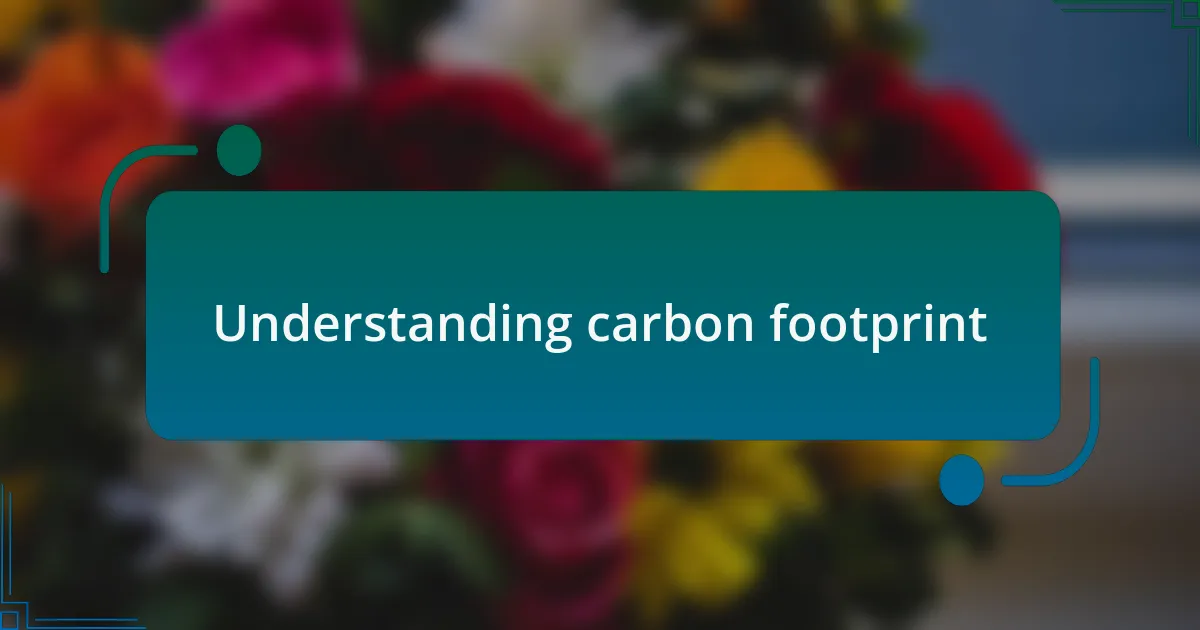
Understanding carbon footprint
Understanding carbon footprint is about recognizing the total greenhouse gas emissions tied to our activities, expressed in terms of carbon dioxide equivalents. When I first started looking at this concept, I was surprised to learn that even routine actions—like driving my car or using electricity—contribute significantly to my overall impact. Have you ever stopped to think about how many emissions come from just a single trip to the grocery store?
I remember the moment I realized the scale of my carbon footprint. During a workshop, a simple calculation demonstrated how my daily choices in food, transportation, and energy use added up. It struck me that my love for avocados, while delicious, had a bigger environmental cost than I imagined due to transportation emissions. Isn’t it fascinating how interconnected our decisions are with the planet’s health?
To truly understand one’s carbon footprint, it’s essential to consider the lifecycle of products, from production to disposal. I often find myself reflecting on this when I throw away plastic containers; it feels wasteful and leaves me wondering what alternative choices I could make. This awareness not only fuels my desire to reduce my footprint but also motivates me to educate others about making more sustainable decisions in their own lives.
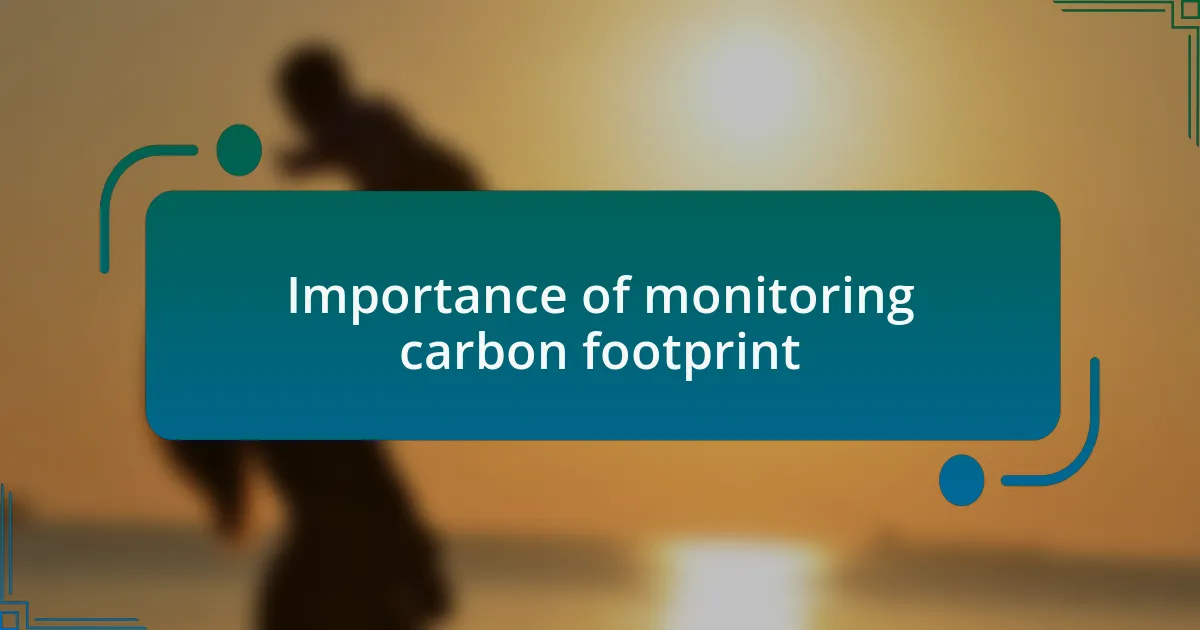
Importance of monitoring carbon footprint
Monitoring my carbon footprint is crucial because it empowers me to make informed choices. When I started tracking my emissions, I was shocked to see how quickly small changes could lead to significant reductions. Have you ever considered how switching to energy-efficient bulbs in your home could not only lower your bills but also positively impact the environment?
I’ve noticed that when I actively monitor my carbon footprint, it encourages a mindset shift. For instance, I began biking to work instead of driving, which not only reduced my emissions but also brought a refreshing sense of well-being to my daily routine. Isn’t it amazing how such a practical step can enhance both my health and the planet’s?
Moreover, tracking my emissions serves as a continual reminder of the legacy I’m leaving behind. Each time I assess my footprint, it prompts me to think about future generations. What kind of planet do I want to pass on? This reflection drives me to advocate for more sustainable practices and share my journey with friends and family, helping to create a ripple effect in my community.
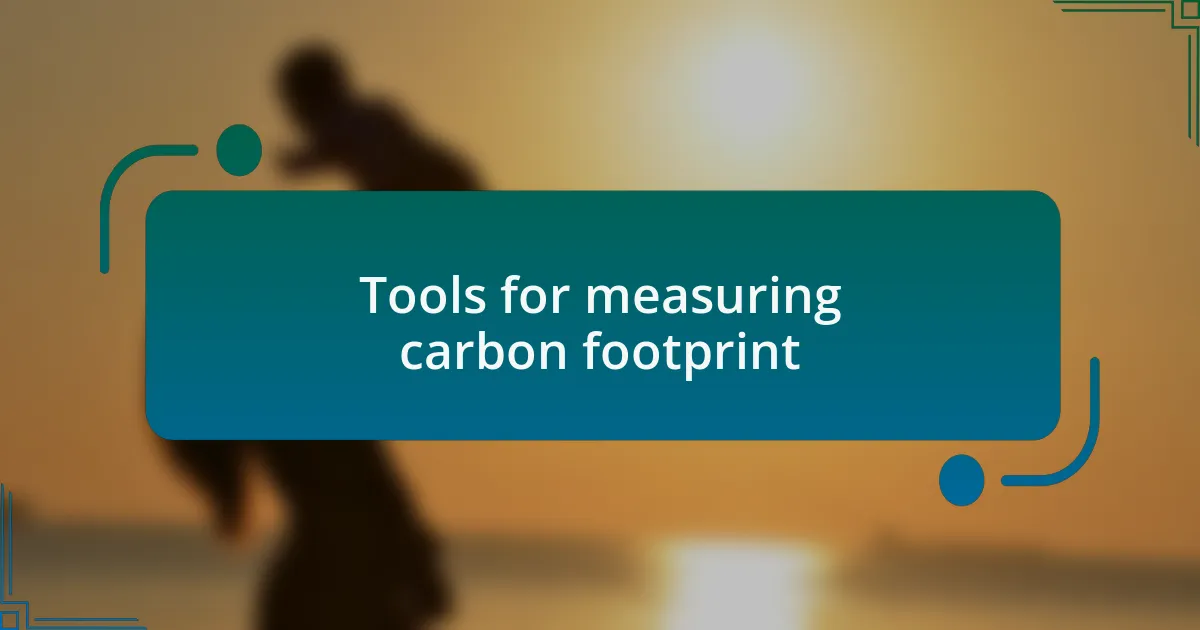
Tools for measuring carbon footprint
There are several effective tools for measuring my carbon footprint that I’ve found particularly helpful. For instance, I often use online calculators where I can input my lifestyle habits, such as my transportation methods and energy consumption. It’s surprisingly easy to see how my daily choices stack up against average benchmarks, which makes the whole process feel rewarding yet eye-opening.
One application that I regularly turn to is an app that tracks my carbon emissions from various activities, like shopping or dining out. It provides real-time feedback, which encourages me to make more sustainable choices. Have you ever realized how much energy it takes to produce certain foods? Knowing this makes me think twice about how I shop for groceries.
I also appreciate the integration of sustainability metrics into my fitness tracker. When I bike, the app not only tracks my miles but also calculates the emissions I’ve avoided by choosing to cycle instead of driving. Hearing that I’ve saved a specific amount of CO2 feels like a small victory. How empowering is it to know that every pedal stroke counts toward a healthier planet?
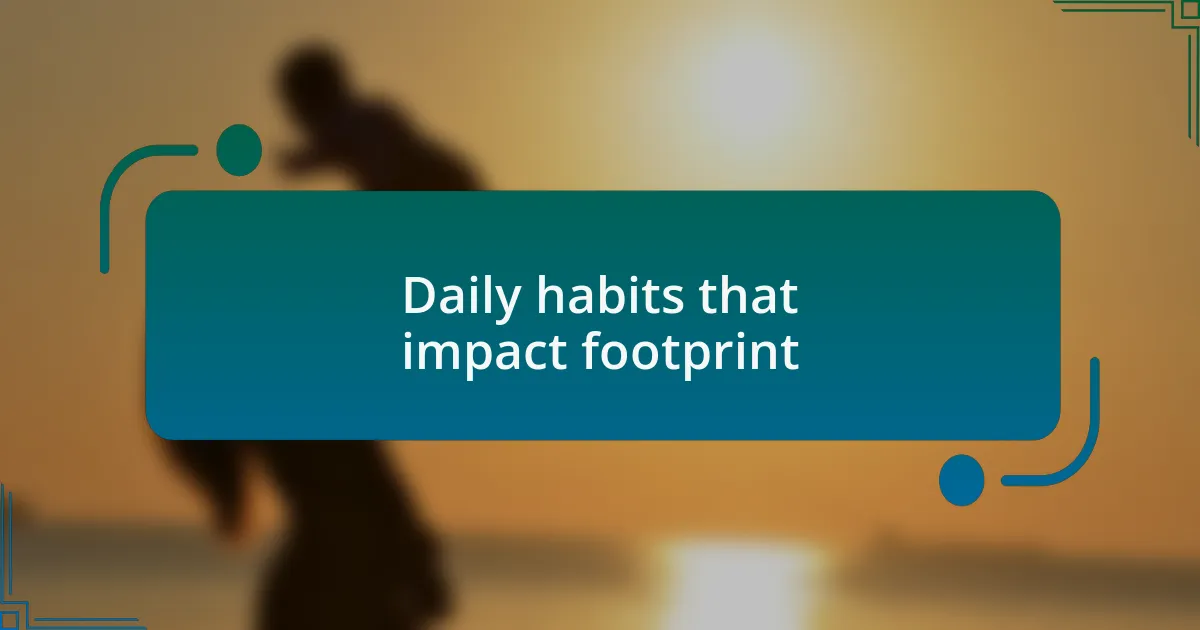
Daily habits that impact footprint
When I think about my daily habits, I realize how small changes can lead to significant reductions in my carbon footprint. For example, I started carrying a reusable water bottle everywhere I go. It’s not just convenient; every time I sip from it, I feel a sense of accomplishment knowing that I’m cutting down on single-use plastic waste. Have you ever calculated how many bottles you might save in a year?
One habit that has made a surprisingly big difference is my decision to reduce meat consumption. I never thought I’d be able to give up red meat entirely, but when I learned about its environmental impact, I started opting for plant-based meals a few times a week. This shift not only benefits the planet but has also introduced me to a new world of delicious recipes and flavors that I hadn’t explored before. Isn’t it incredible how our choices can lead to new discoveries?
Another daily action that impacts my carbon footprint is choosing to bike instead of drive whenever possible. Each ride feels like a mini adventure. Not only do I save on fuel, but I also enjoy the fresh air and exercise. It’s moments like these that remind me how interconnected our choices are with our well-being and that of the environment. What could be more fulfilling than knowing that every ride contributes to a cleaner planet?
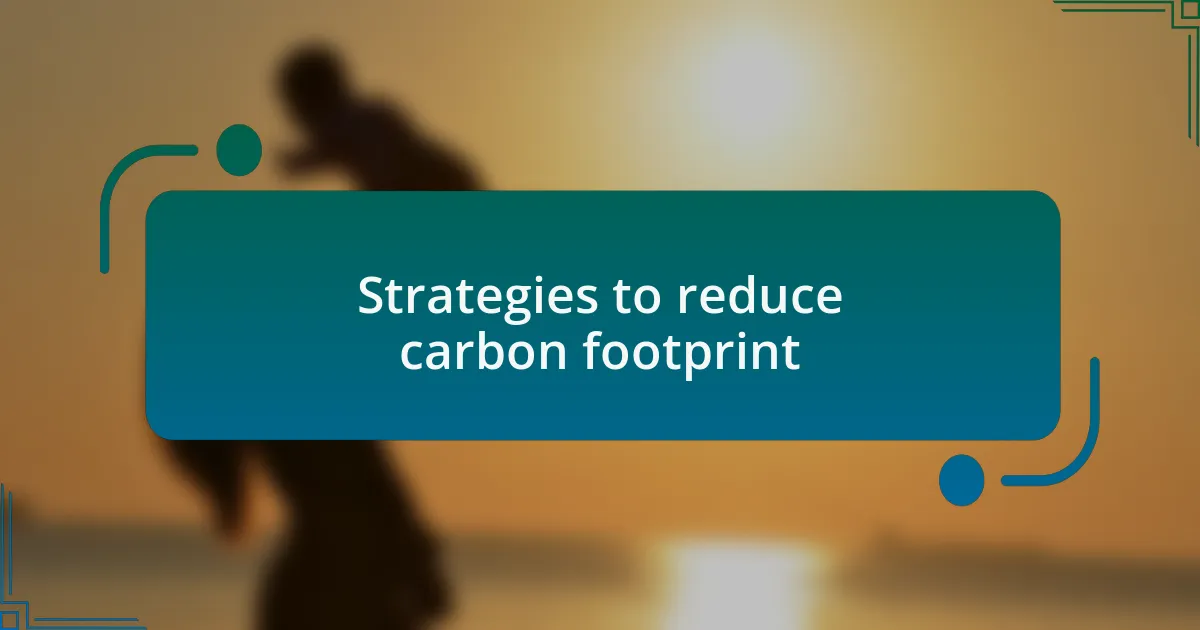
Strategies to reduce carbon footprint
Making simple switches in the products I use has been transformative. For instance, when I made the change to eco-friendly cleaning supplies, not only did my home smell fresh, but I also felt lighter knowing I was avoiding harmful chemicals that could contribute to air pollution. Have you ever thought about how the small things we use every day can make a big difference?
Reducing energy consumption in my home has also played a significant role. I started using LED bulbs and unplugging devices when they’re not in use. The first time I noticed a drop in my electricity bill, it felt like finding money I didn’t know I had! It’s incredible how being mindful about energy can save money and the planet simultaneously. Why not take a moment to evaluate the energy habits in your own home?
Lastly, I’ve embraced the power of community and shared resources. By participating in a local carpool group, I’ve not only formed new friendships but also drastically cut down on my commuting emissions. It’s amazing to see how teamwork manifests in environmental efforts, which leaves me wondering – what impact could each of us have if we collaborated more?
![]()
Personal tracking and accountability
Keeping track of my carbon footprint has been eye-opening. I started using a simple app to log my daily activities, like driving distances and energy usage. At first, I was shocked by the numbers; it made me wonder: how had I overlooked my impact before?
Accountability is crucial in this journey. I’ve set personal goals based on what the app reveals. For example, after seeing my transportation emissions, I challenged myself to walk or bike for short trips. I remember the thrill of accomplishing that goal—each step felt like a win for the planet and my personal health.
I often share my progress with friends, which creates a supportive network. When I talk about my efforts to reduce energy consumption or how many car trips I avoided this month, it sparks discussions about green living. Who knew that by being open about my journey, I could inspire others to take those first steps? It’s a reminder that we are all in this together.
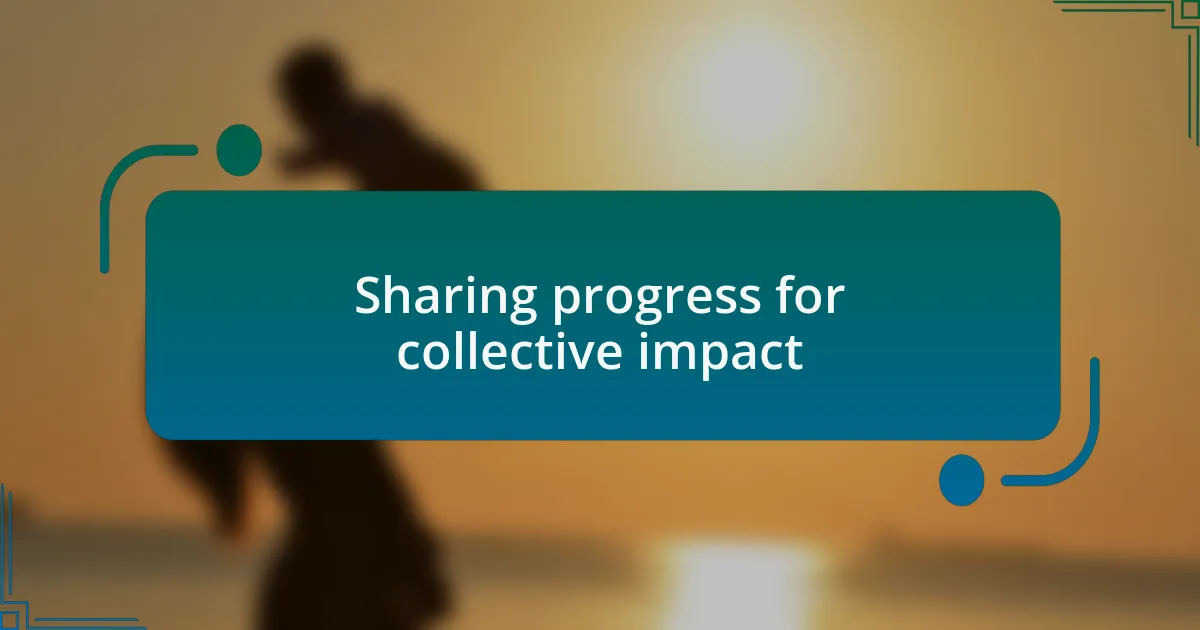
Sharing progress for collective impact
When I share my carbon tracking journey with others, I often see a spark of curiosity in their eyes. Has anyone else experienced that moment when you realize your actions can lead to change? For instance, I posted my latest reduction in electricity usage on social media and was surprised by the number of people who wanted to join me in comparing strategies. It’s like an informal challenge that cultivates our shared values around sustainability.
Building a community focused on progress not only motivates me but also creates an atmosphere of accountability. The other day, a friend reached out to discuss how my recent efforts to compost have inspired her to start her own compost bin. It felt amazing to know that by simply documenting my experiences, I could influence her environmentally-friendly choices. Isn’t it incredible how our individual actions can ripple outward and create a wave of collective impact?
I also participate in local workshops and online forums where people discuss their carbon footprint goals. Listening to others share their stories encourages me to rethink my approach. During one session, someone mentioned their struggle with water usage, and it made me reflect on my habits as well. Could we all benefit from more honest dialogues about our journeys? I believe that by sharing our successes and setbacks, we form connections that deepen our commitment to making a difference together.